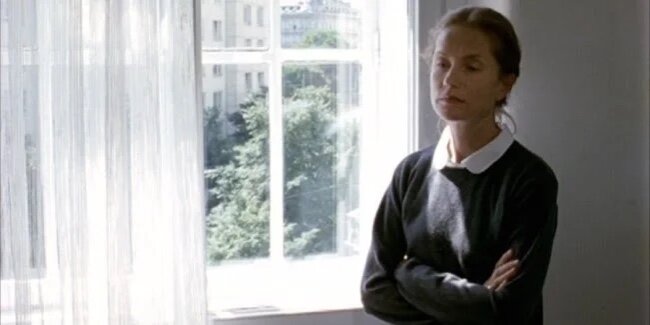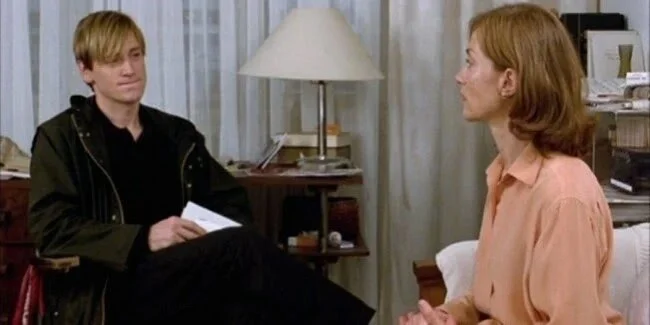Film Retrospective — "The Piano Teacher"
This retrospective first appeared on Filmotomy.com.
Isabelle Huppert’s spellbinding turn as Michèle in Elle is perhaps my favorite performance of 2016. When Huppert entered the Oscar race, I was an early proponent, even before I’d seen the film. Because I’d already been a fan of hers for nearly a decade. My fandom began in high school with, as a matter of fact, The Piano Teacher.
I became serious about cinema in my teenage years. After completing the IMDb Top 250 (as it stood then), I waded through the Criterion Collection—the capital-F Films that my youthful
exuberance perceived as capital-I Important. I devoured and praised them, even when I didn’t
fully comprehend them.
My hometown library owned an impressive amount of Criterion material, and one of the first ones I checked out—at maybe 15—was The Piano Teacher, the dark psychosexual drama for which Huppert won her second Best Actress prize at Cannes.
Based on a novel by Nobel-winning writer Elfriede Jelinek, the story centers on a self-harming pianist and the young man she captivates. Isabelle Huppert plays Erika Kohut, the titular teacher, and she delivers an undeniably brilliant performance that leaves the audience feeling just as scarred her character.
Erika never became a fulltime musician, one who makes their sole living from playing. And she has reached the age where such a life is long behind her. So now she lords over her gifted Viennese conservatory students who will undoubtedly surpass her level of success someday.
Now in her 40s, Erika knows she never met her potential, so she chastises herself in private while publicly exerting supremacy as a member of the faculty. In the rehearsal room, she’s a predator. But at home, she tortures and mutilates herself until she bleeds.
Outside of her apartment and the conservatory, Erika spies on fornicating couples and patronizes sex shops, making men uncomfortable everywhere. She sits in porno-viewing booths and scours the trash bins for the soiled tissues of previous occupants and presses them to her cold face. Erika hurts—and debases herself with ejaculate-stained rubbish—because she has yet to find a man to do it to her in the flesh.
Enter Walter Klemmer, played by Benoît Magimel, whom she meets at a recital. An engineer with an insatiable masculine energy, Walter also plays piano, and admires Erika for her taste and skill. He’s so enchanted by her that he auditions for her school.
His revisionist execution of Schubert wows the faculty, and though she’s discernibly affected by his notes, Erika votes against him to the shock of her colleagues. She cites his liberal reading of the music as the grounds for her disapproval, but the truth is that Walter represents a threat to her dual personae. If he becomes a pupil, her separate spheres of dominance and submission will collide. And she cannot tolerate that.
Nevertheless, she’s outnumbered, and Walter receives admission. Thus, his virility permeates the terrain where she preys upon the weak so as to mask her insecurities. And now that Walter prowls the halls, Erika’s smokescreen is in jeopardy. He may be the beast she’s been waiting for.
One day, he follows her into a public washroom and forcibly puts his mouth on hers. Ever the arrogant young man, Walter thinks he has the upper hand. But she reciprocates by belittling and aggravating him. She won’t be bested so easily. Erika toys with Walter’s, ahem, manhood then discards it—stimulating him without letting him finish.
Erika weaponizes Walter’s sex, refusing to allow the encounter go his way; they’re still on her turf after all, even if he is attempting to usurp it. Isabelle Huppert wields an otherworldly grit in this scene. It’s clear why she so beguiles Walter. He pictures her as a masterful lover, nearly twice his age, with tons of sexual prowess. He senses an animalism—an untamable nature—that he’s dying to unleash. And he’s not entirely mistaken… making the direction Erika steers the film in all the more enthralling.
To Walter’s dismay, Erika sets strict terms for their relationship. She pens a letter listing her desires. Masochistic fantasies requiring him to overpower and torment her, consensually. To essentially deride her as she did him, but more extremely. However, her conditions sicken him. She confronts him later on, and they have a botched sexual tryst in a gym closet that ends with Erika vomiting and Walter storming out in disgust.
Erika is humiliated. She returns home, where she and her imperious mother cohabitate—they even sleep in the same bed. (Many of Erika’s sexual wants probably stem from her relationship to her authoritative mother.) That night, Walter barges into Erika’s apartment and locks her mother in the bedroom and proceeds to physically abuse Erika. He beats her, knocks her down, kicks her, and brutally penetrates her as her mother screams in horror from the adjacent room.
Walter channels his repulsion and gives Erika—as he sees it—everything she wants. But, ultimately, the attack is uncalled for and beyond her control, a key detail that he seems to have
ignored. Walter eventually leaves her bleeding on the floor.
The next evening, Erika, still bruised, arrives at a concert hall where she is scheduled to play. She stands in the grand lobby as Walter enters. He glibly snickers at her and continues on to his seat. She remains in the lobby until it empties. Alone now, she withdraws a hefty kitchen knife from her purse and stabs her own breast: the perfect punctuation for this disturbing romance.
The Piano Teacher is a difficult film to stomach, but Isabelle Huppert’s riveting performance makes it a must-see. Erika Kohut’s complexity is unbelievably rich, permitting Huppert to probe the darkest reaches of carnal cravings. Few actors possess the boldness that Isabelle Huppert shows in The Piano Teacher.




